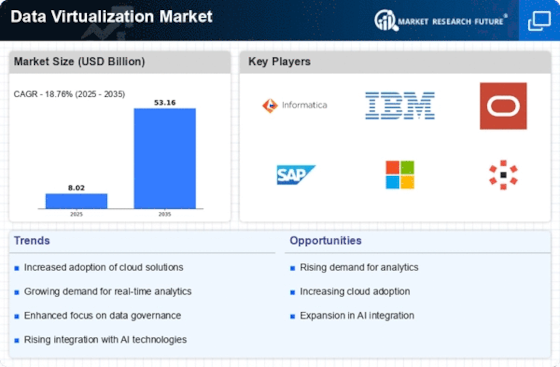Top Industry Leaders in the Data Virtualization Market

The Data Virtualization Market: A Landscape in Flux
The data landscape is undergoing a seismic shift. The insatiable appetite for insights, fueled by the proliferation of data from diverse sources, has pushed organizations toward solutions beyond traditional data integration. Enter data virtualization, a game-changer offering unified access to disparate data without physical movement or replication. With organizations struggling to effectively manage and extract insights from disparate data sources, data virtualization's ability to provide a unified, logical view is proving highly valuable.
Key Players:
-
IBM Corporation (US)
-
SAP SE (Germany)
-
Dell Corporation (US)
-
Microsoft Corporation (US)
-
VMware Inc. (US)
-
Red Hat Inc. (US)
-
Fujitsu Limited (Japan)
-
Cisco Systems, Inc. (US)
-
Citrix Systems, Inc. (US)
-
Oracle Corporation (America)
Market Share Analysis:
Determining market share in this dynamic landscape is a complex endeavor. Traditionally, factors like revenue and installed base were the primary metrics. However, the rise of cloud-based solutions and subscription models necessitates a more nuanced approach. Key factors to consider now include:
-
Data volume processed: This metric reflects the actual workload handled by the data virtualization platform, providing a more accurate measure of market impact.
-
Number of active customers: This factor indicates the platform's reach and adoption across diverse organizations.
-
Customer satisfaction and retention: Positive user sentiment and low churn rates demonstrate the platform's effectiveness and value proposition.
New and Emerging Companies:
The data virtualization market is constantly evolving, with exciting startups emerging to challenge established players. Companies like Akeneo, Collibra, and McData are making waves with innovative approaches to data governance, data catalogs, and real-time data integration, respectively. These new entrants bring fresh perspectives and agility, potentially disrupting the competitive landscape.
Investment Trends:
Current investment trends in the data virtualization market point towards an emphasis on:
-
Cloud-native solutions: The shift to cloud-based infrastructure is driving demand for data virtualization platforms built for and optimized for the cloud. Players are investing heavily in cloud-native architectures and seamless integration with existing cloud ecosystems.
-
AI and machine learning integration: Embedding AI and machine learning capabilities into data virtualization platforms is gaining traction. This enables automated data discovery, cleansing, and transformation, further streamlining data access and analysis.
-
Security and privacy: As data regulations become stricter, data virtualization vendors are prioritizing security and privacy features to ensure compliance and build trust with customers.
Latest Company Updates:
-
November 22, 2023: Denodo, a leading data virtualization platform provider, announced the launch of Denodo Data Catalog 8.0, offering enhanced data governance and lineage tracking capabilities.
-
December 15, 2023: Informatica, another major player in the market, acquired data integration platform Cask, aiming to strengthen its data management offerings.
-
January 4, 2024: IBM unveiled enhancements to its data fabric solution, including tighter integration with its AI platform Watson, for improved data access and analysis.










